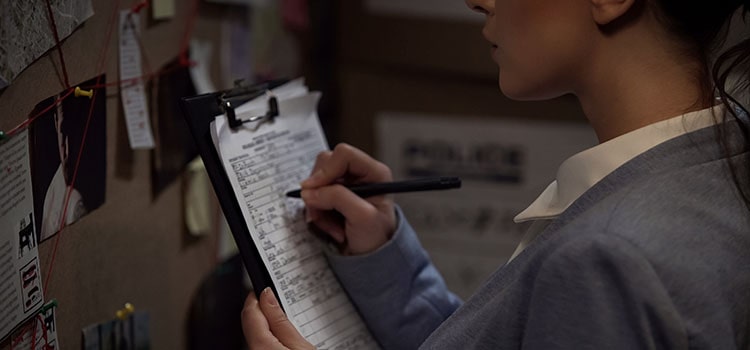In this Article
Private Investigations
Overview
Private Investigation Salary
Private Detective Duties
Bounty Hunter Career Guide
Private Investigator Schools in Virginia
Oregon Private Investigator Schools
Private detective career guide: Investigator skills, duties and education

Private detectives assist in civil liability and personal injury cases, insurance claims, fraud, child custody and protection cases, marital infidelity cases and even premarital screening. They can also offer pre-employment verification as well as executive, corporate and celebrity protection services.
The foundation of private investigation is field work. Detectives make phone calls or visit a subject’s workplace to verify facts. In missing persons and background check cases, investigators often interview people to gather as much information as possible.
How to become a private detective
Research your state’s requirements.

It is essential to research your local eligibility and education requirements, as they vary from state to state. Most states require applicants to pass an exam before a license can be awarded, and aspiring private investigators must undergo a background check and fingerprinting.
Fulfill your state’s education requirements.

Most hiring agencies require at least a high school diploma or GED. A college degree in a related field such as criminal justice can benefit candidates pursuing a career in private investigation, even if completed online. Developing computer skills can also be essential to successful private detectives. Independent investigation relies heavily on the use of computers and search engines for gathering data. Private investigators could find themselves behind a computer just as often as they find themselves out in the field.
Complete the required training.

Self-defense and firearm training, as well as knowledge of de-escalation techniques, benefit those pursuing PI work. The private investigation field can be dangerous at times, so proficiency in self defense, and knowledge of techniques that can prevent the need for self defense, can help candidates practice safely and confidently.
Gun laws and concealed-carry licensing laws vary state by state and it is important to have a clear understanding of the firearm laws in the state(s) in which you practice. Often, PI work requires crossing state lines, making it essential to be educated on each state’s laws.
Pass a background check and meet additional state requirements.

Many states disqualify candidates with felony or violent misdemeanor convictions in their criminal history, although requirements do vary from state to state.
In addition, candidates should understand any supplementary requirements their state imposes.
Apply for and earn your license.

Once you have met all the requirements for your PI application, it is important to prepare for the licensing exam. Topics on your state exam may include state and federal law, criminal justice, as well as investigation procedures and protocols. The length and overall difficulty of the licensing exam depends on your state’s curriculum, and you may be able to find a study guide on the state department of licensing website.
Certain jurisdictions require private investigators to take continuing education and training courses to maintain their license and keep up to date on laws. Renewing your license may require a re-application process that involves another background check and fee every one to three years.
Consider pursuing certifications.

There are many organizations that offer private investigation certifications. The National Association of Legal Investigators (NALI) awards the Certified Legal Investigator credential to licensed investigators who specialize in negligence or criminal defense investigation and meet experience, education and continuing education requirements.
While certifications are generally not required, they showcase a level of expertise that can help you stand out from others in the field.
Private detective job description
Private detectives investigate and research nearly anything requested by a client. For instance, PIs could be tasked with verifying insurance claims or performing premarital screens. Their work tends to involve researching subjects and their backgrounds by performing interviews and surveillance, checking public records, researching a subject’s social media presence, and performing audits of financial records among many other potential tasks.
In addition, private investigators often enlist the help of others with skills in particular areas that the investigator may lack. For instance, a PI could tap the expertise of a certified public accountant to assist with auditing financial records, or a cybersecurity expert to help discern the root cause of a network intrusion.
Because their work can involve surveilling individuals outside of business hours, private detectives often find themselves working irregular hours and sometimes more than 40 hours per week.
What skills and traits do you need to be successful?
Experience in public surveillance, evidence collection, running background checks and searching public records are just a few of the regular tasks a PI performs.
Other useful skills and traits include:
- Patience
- Ability to solve complex problems
- Ability to communicate clearly and thoroughly
- Attention to detail
- Interviewing
- Photography
- Knowledge of the legal landscape
- Organization
- Discretion
“In our opinion, a good private investigator needs to be a good listener and have integrity. But timing, timing, timing is everything,” said investigator Cindy Crosby, of Crosby Investigations, based in Plano, Texas.
Commonly used software and tools
Strong computer skills are essential. Many private detectives spend considerable time researching and compiling data online. The internet, social media and various online databases can help solve and wrap up investigations, so an understanding of computer science can be one of the handiest and most-used tools in a private detective’s toolbox.
Public records databases, mobile tracking software, online background checks and other online resources may also be regularly utilized, so private investigators should have working knowledge of computer forensic software systems and tools.
Tools and software often include:
- Spyware
- GPS devices
- Cameras
- Background checking services
- Layered voice analysis
- Surveillance drones
- RF signal detectors
What education is required?
While there are no academic requirements for basic PI work, a two-year associate’s program or a 4-year bachelor’s degree in a field related to criminal justice may be helpful and can provide hard skills and knowledge that augment innate traits such as curiosity, patience, resourcefulness and intuition.
If you plan to work as a corporate investigator, you should consider earning a bachelor’s degree. Some corporate investigators have master’s degrees in business administration or law, but any training could help you in your career. Some corporate investigators hired by large companies may receive on-the-job training in business practices, management structure and various finance-related topics directly from their employers.
Many criminal justice programs cover private, criminal, financial and other investigation techniques.
Licensing and Certification
Most states require private detectives and investigators to be licensed. Requirements vary widely for licensing, but a general rule is that most felony convictions will disqualify a candidate.
For instance, in California, private detectives must meet the following requirements to become licensed:
- Be at least 18 years of age
- Have a combination of education in police science, criminal law or justice
- Have three years (6,000 hours) of investigative experience
- Pass an evaluation by the Federal Department of Justice and a criminal history background check
- Pass a state examination covering laws and regulations
- Meet requirements for a firearms permit
It is essential for anyone wishing to pursue a private detective license or certification to research and identify the different requirements and standards within their intended state of practice.
Certification
There are numerous different organizations that certify investigators. Since each state or region may have different requirements and standards for licensing or certification and investigators can be licensed to work in multiple states, each candidate will have a unique path towards earning the needed qualifications.
For those looking to specialize in negligence or criminal defense investigation, the previously mentioned NALI offers the title of Certified Legal Investigator (CLI) to those who meet these requirements:
- Majority of practice goes towards investigations for plaintiffs or defense attorneys (more specific details available through NALI)
- Five years verifiable work experience, with the opportunity to substitute some education work
- Licensed by state as applicable
- No felony convictions
- Submit the application form, fee and a white paper on an investigative subject
- Complete written and oral exams administered by the CLI committee, earning 70% or higher in each section of exam
Other certifications you look for will be highly specialized to your career and region. A PI looking to specialize in cyber intelligence might explore their options in cybersecurity certification on the National Initiative for Cybersecurity Careers and Studies Education & Training Catalog, and an investigator wanting to work violent crimes cases might aim for forensic certifications offered by the International Association for Identification. Joining your local investigation association can be useful and often provides opportunities for continued education.
Self-employed private investigation vs. corporate or agency private investigation
Candidates pursuing a career in private investigation may choose to build a private practice rather than stick to salaried or scheduled positions. This requires starting a business, building a clientele and developing a rapport among your community. Self-employed private investigators often rely on their own independent business skills in advertising, marketing and self-promotion to help showcase their business to potential clients.
However, working for a larger agency or corporate office can allow private investigators to focus on detective work over business and promotion, since agencies and corporations may already possess a network of clients and the marketing and business development departments capable of growing it.

